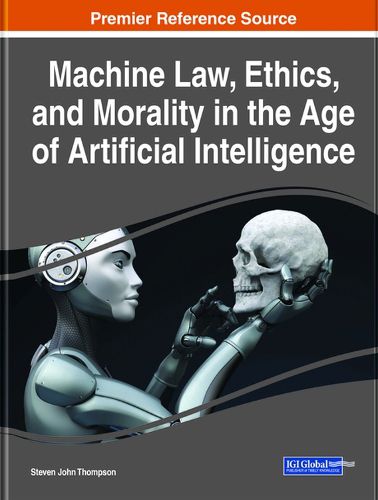Readings Newsletter
Become a Readings Member to make your shopping experience even easier.
Sign in or sign up for free!
You’re not far away from qualifying for FREE standard shipping within Australia
You’ve qualified for FREE standard shipping within Australia
The cart is loading…






This title is printed to order. This book may have been self-published. If so, we cannot guarantee the quality of the content. In the main most books will have gone through the editing process however some may not. We therefore suggest that you be aware of this before ordering this book. If in doubt check either the author or publisher’s details as we are unable to accept any returns unless they are faulty. Please contact us if you have any questions.
Machines and computers are becoming increasingly sophisticated and self-sustaining. As we integrate such technologies into our daily lives, questions concerning moral integrity and best practices arise. A changing world requires renegotiating our current set of standards. Without best practices to guide interaction and use with these complex machines, interaction with them will turn disastrous.
Machine Law, Ethics, and Morality in the Age of Artificial Intelligence is a collection of innovative research that presents holistic and transdisciplinary approaches to the field of machine ethics and morality and offers up-to-date and state-of-the-art perspectives on the advancement of definitions, terms, policies, philosophies, and relevant determinants related to human-machine ethics. The book encompasses theory and practice sections for each topical component of important areas of human-machine ethics both in existence today and prospective for the future. While highlighting a broad range of topics including facial recognition, health and medicine, and privacy and security, this book is ideally designed for ethicists, philosophers, scientists, lawyers, politicians, government lawmakers, researchers, academicians, and students. It is of special interest to decision- and policy-makers concerned with the identification and adoption of human-machine ethics initiatives, leading to needed policy adoption and reform for human-machine entities, their technologies, and their societal and legal obligations.
$9.00 standard shipping within Australia
FREE standard shipping within Australia for orders over $100.00
Express & International shipping calculated at checkout
This title is printed to order. This book may have been self-published. If so, we cannot guarantee the quality of the content. In the main most books will have gone through the editing process however some may not. We therefore suggest that you be aware of this before ordering this book. If in doubt check either the author or publisher’s details as we are unable to accept any returns unless they are faulty. Please contact us if you have any questions.
Machines and computers are becoming increasingly sophisticated and self-sustaining. As we integrate such technologies into our daily lives, questions concerning moral integrity and best practices arise. A changing world requires renegotiating our current set of standards. Without best practices to guide interaction and use with these complex machines, interaction with them will turn disastrous.
Machine Law, Ethics, and Morality in the Age of Artificial Intelligence is a collection of innovative research that presents holistic and transdisciplinary approaches to the field of machine ethics and morality and offers up-to-date and state-of-the-art perspectives on the advancement of definitions, terms, policies, philosophies, and relevant determinants related to human-machine ethics. The book encompasses theory and practice sections for each topical component of important areas of human-machine ethics both in existence today and prospective for the future. While highlighting a broad range of topics including facial recognition, health and medicine, and privacy and security, this book is ideally designed for ethicists, philosophers, scientists, lawyers, politicians, government lawmakers, researchers, academicians, and students. It is of special interest to decision- and policy-makers concerned with the identification and adoption of human-machine ethics initiatives, leading to needed policy adoption and reform for human-machine entities, their technologies, and their societal and legal obligations.